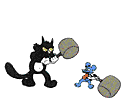| AGGRESSION |
"For every minute you are angry you loose sixty seconds of happiness." -Ralph Waldo Emerson |
| Jen Taylor & Josh Nellist |
|
Biological Functions Twin Studies Social and Social
Factors Treatment for excessive aggression
|
Social Factors in Aggression Undoubtedly there are physiological factors at play in aggression. These factors play a huge role in what types of people will be predisposed to being aggressive. Biology alone, however, does not define the entirety of aggression. A person may be predisposed to be aggressive, but there are thousands of other factors in that person's environment that can encourage or detract from an aggressive behavior. Even a basic understanding of the physiological factors at play in aggression will show that males, on average, will be more aggressive than will females. The question this must raise, however, is how much more aggressive will males be than females based solely on biology? Social conditions also contribute to the expression of aggression. One such study found that peer group relationships have an affect on the level of aggression to which children will engage in. Phillipsen et al. found that boys who are matched up, in a peer group setting, with other boys will become more aggressive than will girls matched up with other girls. Interestingly, the study also found that the most aggressive individuals were the least liked by the peer group, indicating a social negative to engaging in overly aggressive behavior. The role of serotonin in aggression is well documented, but how serotonin becomes such a factor in eliciting aggressive behaviors is up to debate. Studies have shown that many people living in inner city and other low income areas have lower than average levels of serotonin. Low levels of serotonin are one indicator of excessive aggression, which would seem to fit the pattern of inner city violence being higher than the national average. It could be surmised that people with low levels of serotonin tend to be more aggressive, and to be less likely to succeed in life, thus making it likely they would end up in the low income areas of America. That summarization cannot be proven to be true, simply because it is equally likely that the people living in low-income areas become more depressed and accepting of their conditions, which would cause their serotonin levels to decrease, thus increasing the likelihood of aggression. Couple that inreased likelihood of aggression with the already poor life conditions and it is realistic that violence will ensue. Both possibilities have scientific merit. What both possibilities also show is that aggression, while having definite biological beginnings, is dramatically affected by social and environmental conditions. One social factor believed to play a role in the chances of aggression occurring is victim association. Nathanson and Cantor conducted an experiment where by children were exposed to violent movies. The control group was allowed to watch the movie without any training, but a test group was trained to associate and empathize with the victims of the violence before viewing the movie. The children who received the training turned out to be far less likely to engage in violent behaviors than did the control children.
Another extremely important social factor at play in aggression development is parenting. From the moment of inception a child begins to be trained by his/her parents. The early, formative years of a childs life will determine, more than any other period in his/her life, how aggressive that child will be. Studies have shown that parents who show more love and support to a child will likely elicit loving and low-aggressive behaviors. Likewise, parents who show negative feelings to their children or engage in physical violence against the children are very likely to cause similar behaviors in the children. Couple that negative upbringing with a biological predisposition to be aggressive, and a very aggressive and probably violent child will be the result. |
 While
this study concentrated solely on the affect of victim association
training related to violent movies, there is much room for generalizing
the finding to other forms of aggression. One such possibility is
that a lack of victim association may be a possible factor in hate
and race crimes. Since many people cannot associate with another
social or cultural group, it is easier to be aggressive towards
that group. If the committers of such crimes could have been trained
to consider the feelings of their victim before engaging in the
violent behaviors, it is possible the crimes would not have been
committed. This is simply a hypothetical possibility, but it places
a definite importance on the study of the social factors involved
in aggression.
While
this study concentrated solely on the affect of victim association
training related to violent movies, there is much room for generalizing
the finding to other forms of aggression. One such possibility is
that a lack of victim association may be a possible factor in hate
and race crimes. Since many people cannot associate with another
social or cultural group, it is easier to be aggressive towards
that group. If the committers of such crimes could have been trained
to consider the feelings of their victim before engaging in the
violent behaviors, it is possible the crimes would not have been
committed. This is simply a hypothetical possibility, but it places
a definite importance on the study of the social factors involved
in aggression.